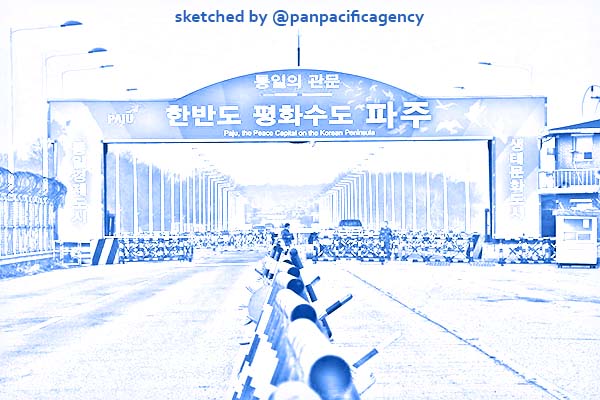New parties in boom with unique policy promises in S. Korea

In this Dec. 16, 2019, photo, South Korean army soldiers stand guard at the Unification Bridge, which leads to the Panmunjom in the Demilitarized Zone in Paju, South Korea. The U.S. is closely watching North Korea for signs of a possible missile launch or nuclear test in the coming days that officials are referring to as a “Christmas surprise.” (AP Photo/Ahn Young-joon). Sketched by the Pan Pacific Agency.
SEOUL, Mar 19, 2020, The Korea Times. Parties promising unique policies are receiving public attention about a month ahead of the April 15 general election, fueled by a revised electoral reform law that aims to make the National Assembly more reflective of the opinions of the electorate. Many new parties have emerged with their own agendas in hopes of winning these new proportional representation seats, The Korea Times reported.
Some of the new parties are making unfeasible promises that could be considered populist. Although their policies are unlikely to be realized, they reflect the problems Korean society is facing and needs to resolve, such as wealth inequality, a low birthrate and North Korea’s continuous nuclear threats.
The National Revolutionary Dividends Party, launched by Huh Kyung-young, a former presidential candidate who ran for the 15th presidential election in 1997 and the 17th in 2007, promises that it will provide all people over the age of 20 with 1.5 million won ($1,206) per month. People who marry will get an additional 100 million won, and newlyweds will have an interest-free house loan of 200 million won, the party says.
It claims the money can be secured by saving the national budget and reducing or abolishing supportive systems for politicians and chaebol.
Such monetary support has long been pursued by Huh, who has gained attention for his unusual remarks, such as claims that he himself is a god and assertions that he was engaged to former-President Park Geun-hye. For the claim involving Park, he was jailed for 18 months for defamation and released in July 2009, and was banned from running in any elections for the 10 years following his release. Now political watchers expect that he will make his “comeback” to the political arena with the April election.
Despite unrealistic promises, more than 1,000 people have applied to become the party’s candidates. Many of the party’s candidate hopefuls are different from those of other big parties, including those currently working as courier service providers, janitors and truck drivers.
The idea of monetary support as a form of basic income has also been highlighted by other politicians as they proposed it as a solution to help citizens facing financial difficulties due to the nationwide COVID-19 outbreak. Public support for the idea is also growing, with a poll conducted on March 13 by Realmeter of 505 adults showing that 48.6 percent were supportive of the idea, up 6 percentage points from a previous poll on March 3.
Meanwhile, the Marriage for Future Party is focusing on tackling the problem of Korea’s low birthrate.
Created by matchmaking company Sunoo’s CEO Lee Woong-jin, it pledges to provide free matchmaking services to all people, give 30 million won to couples engaged to be married, and establish a government agency in charge of marriage and childcare issues.
Another party with unique pledges is the Nuclear Party that urges the country to withdraw from the Nuclear Non-Proliferation Treaty (NPT) and push for development of its own nuclear weapons to counter North Korea’s nuclear threats.
By Jung Da-min